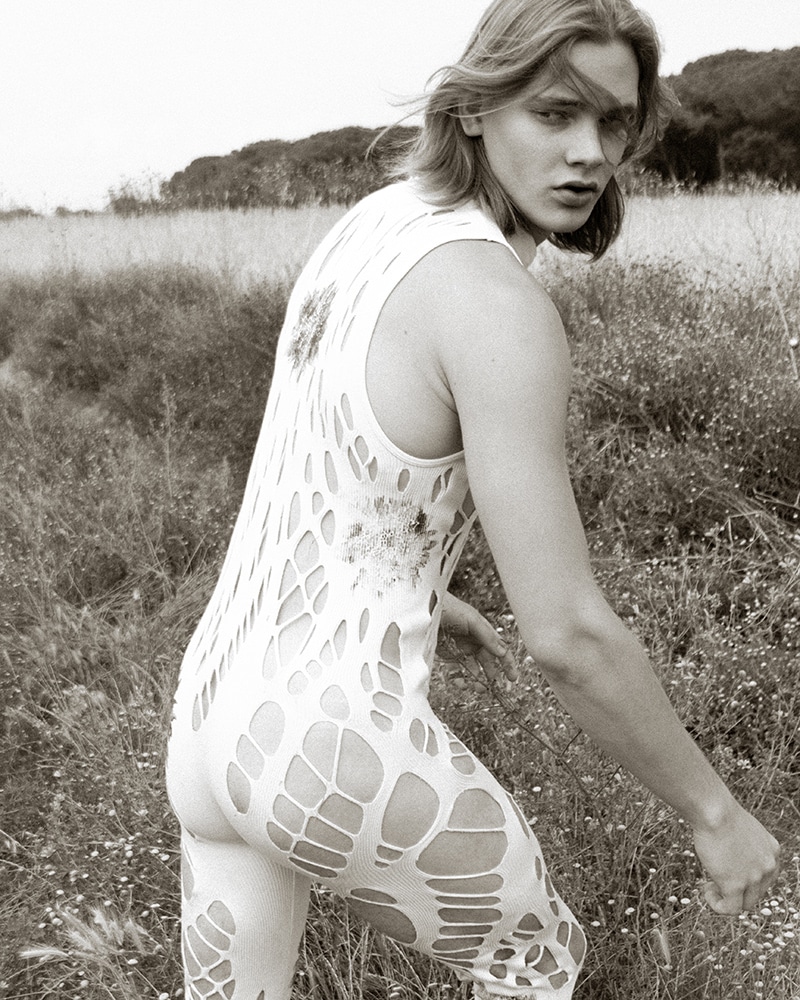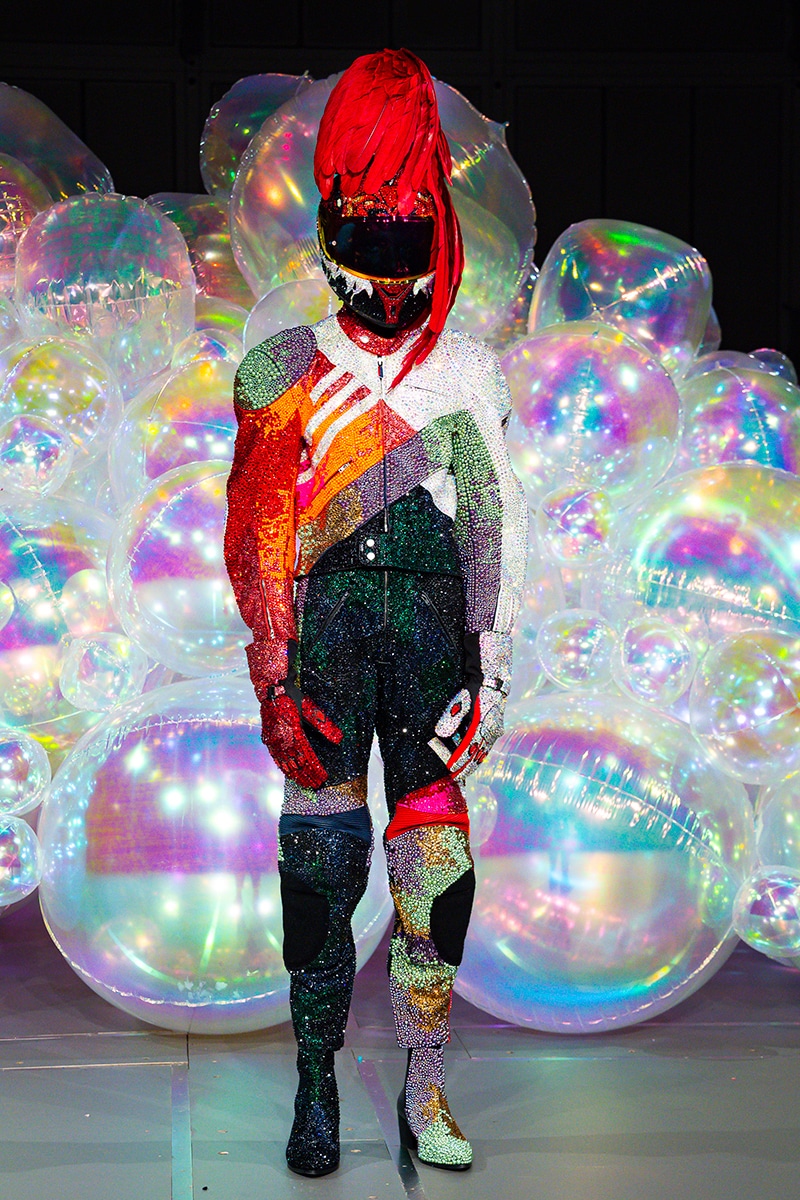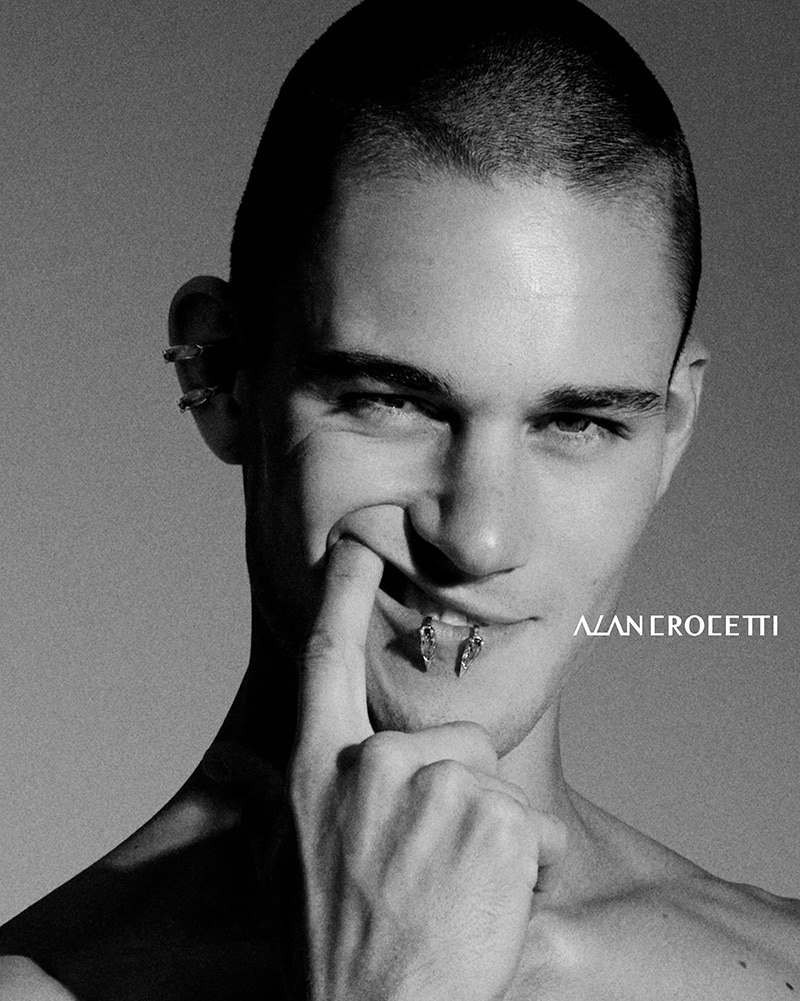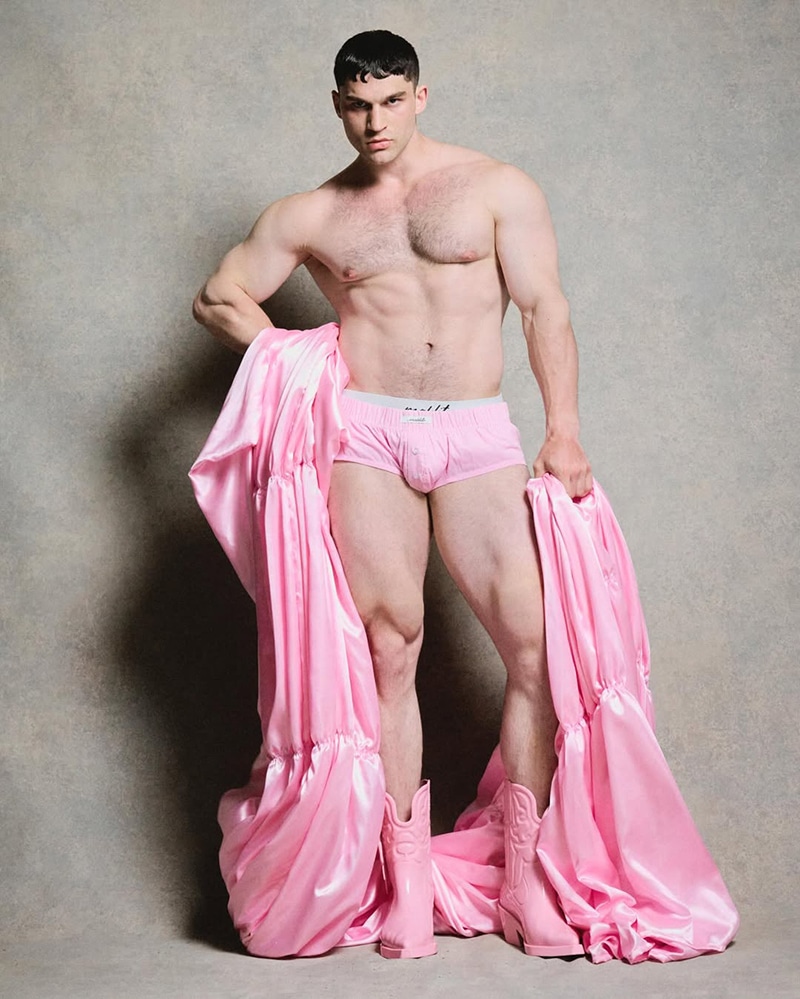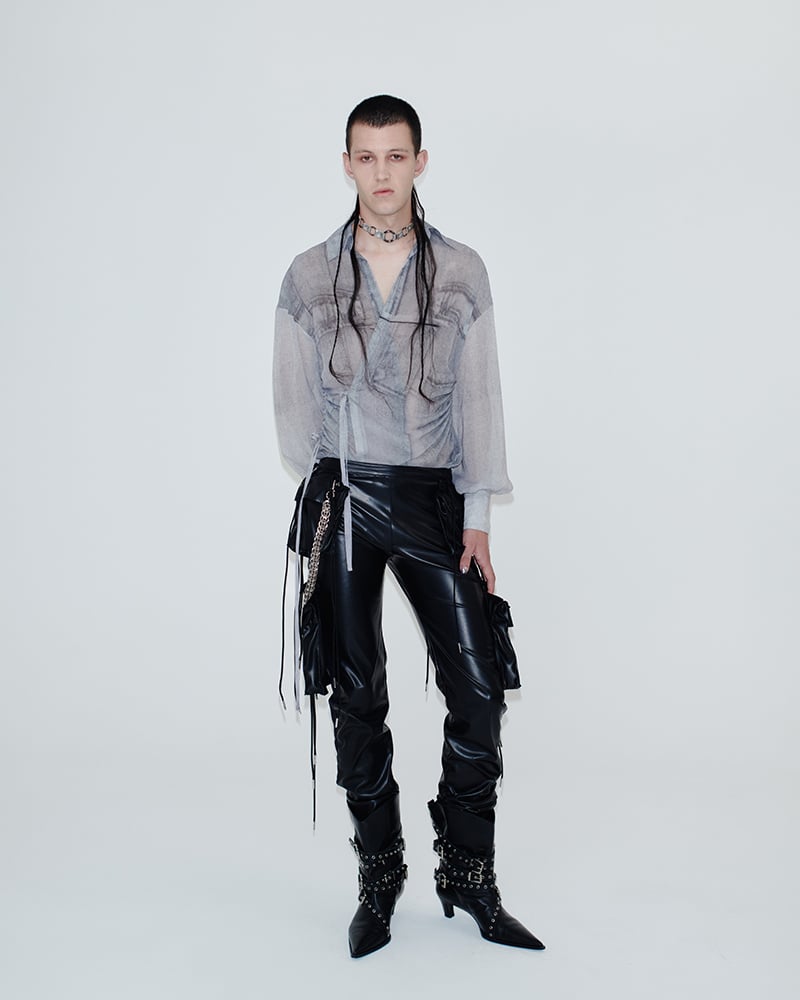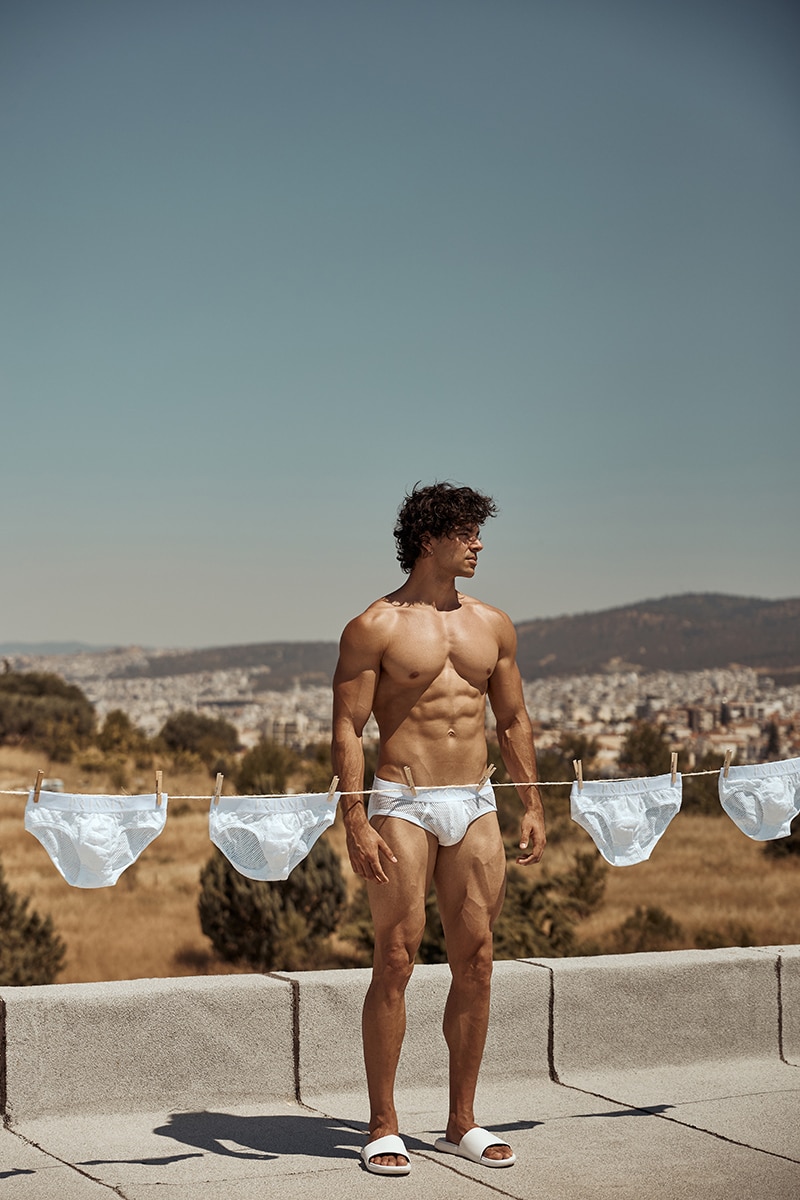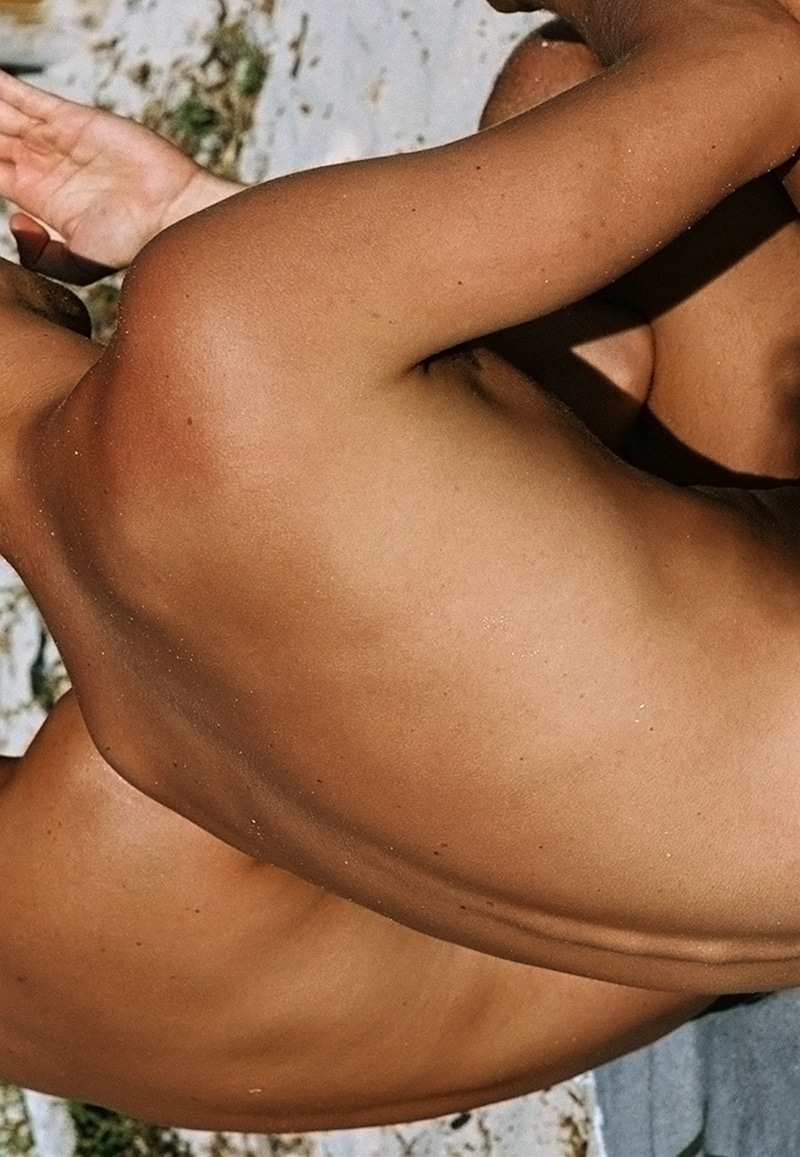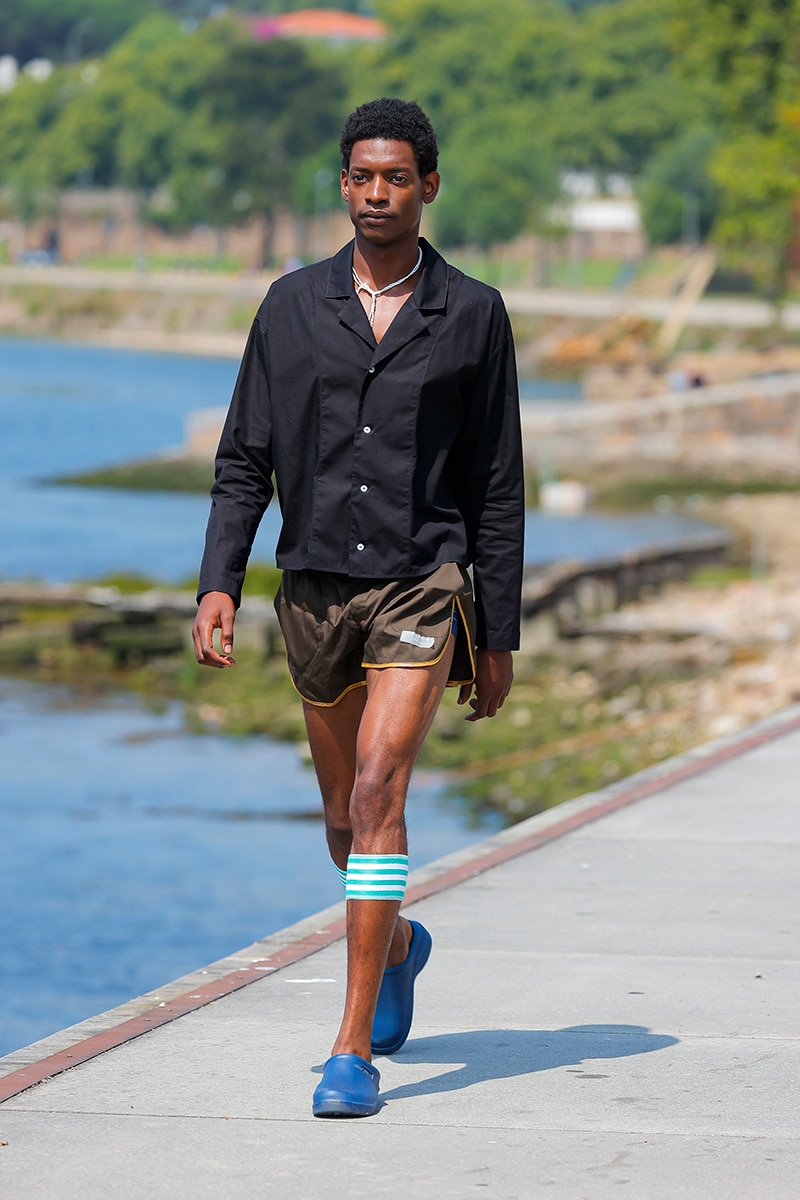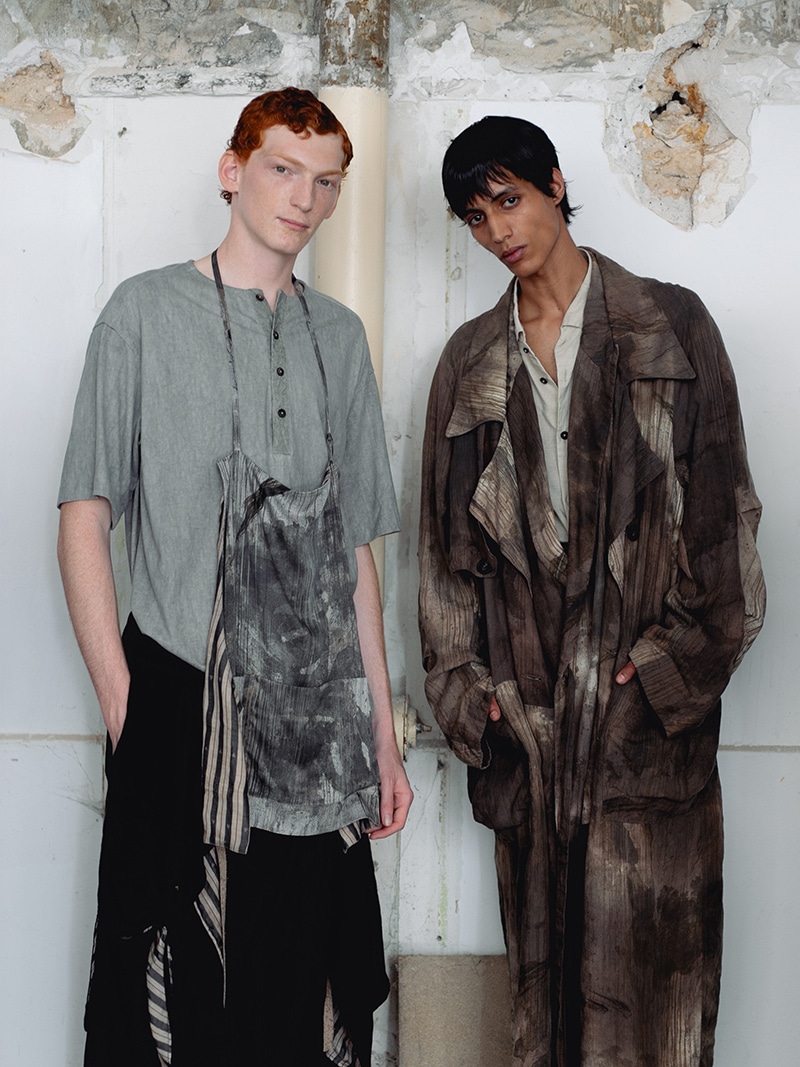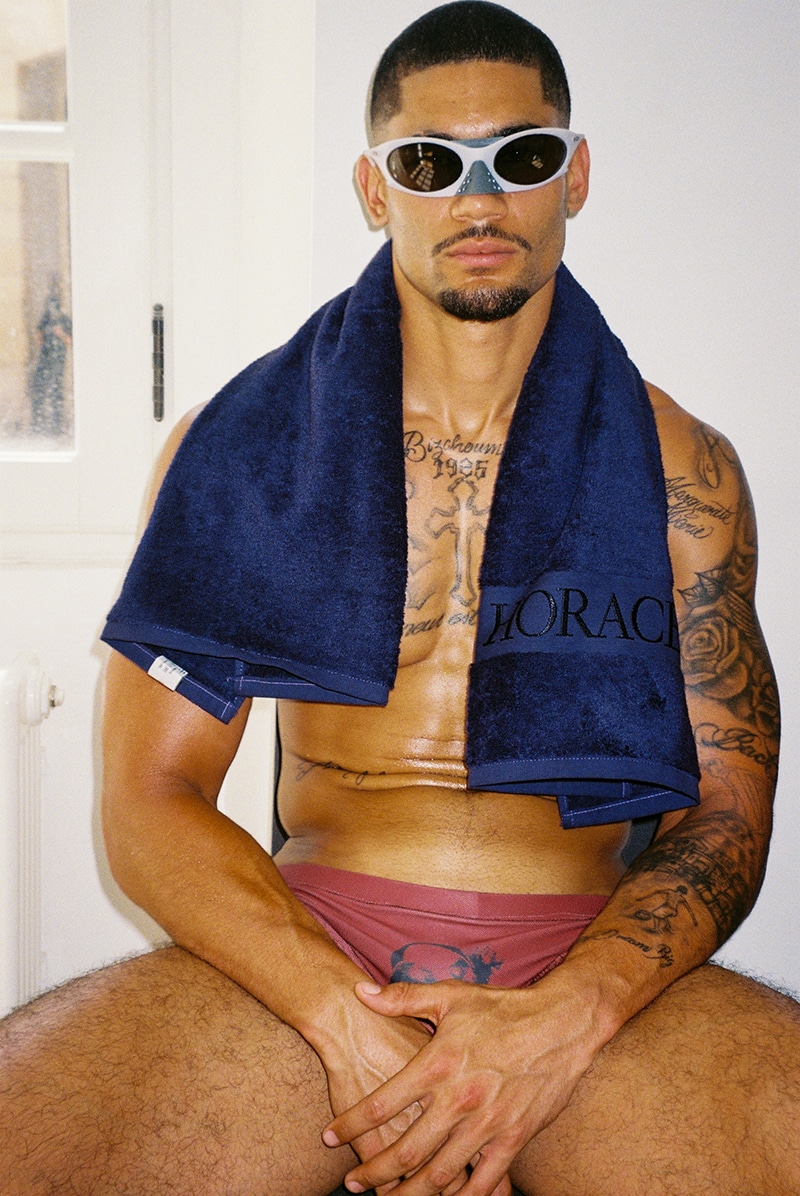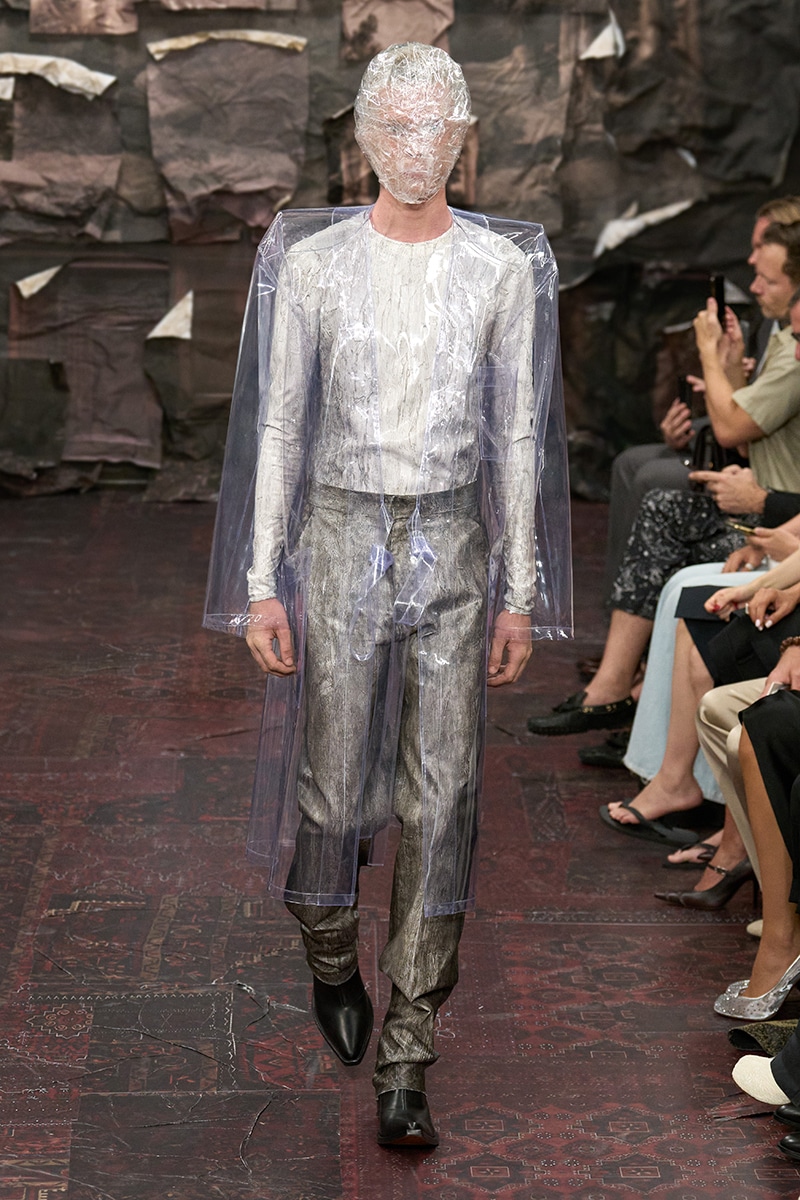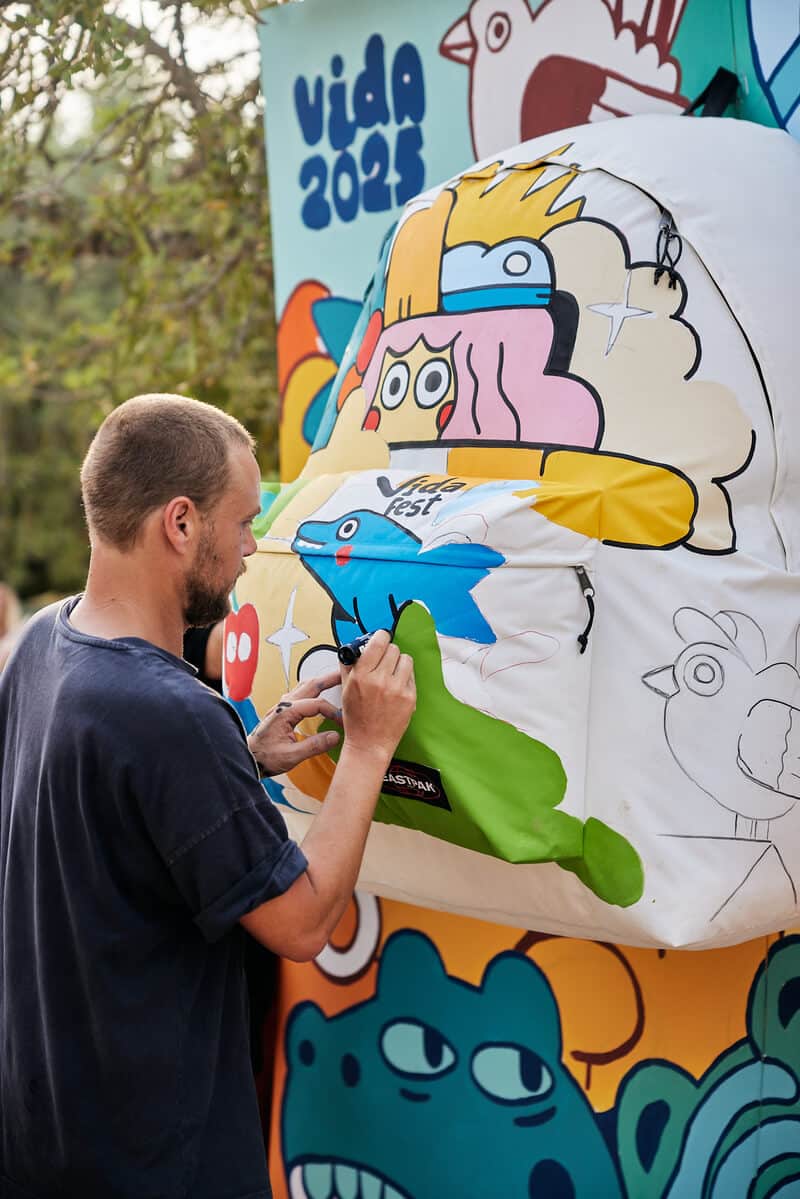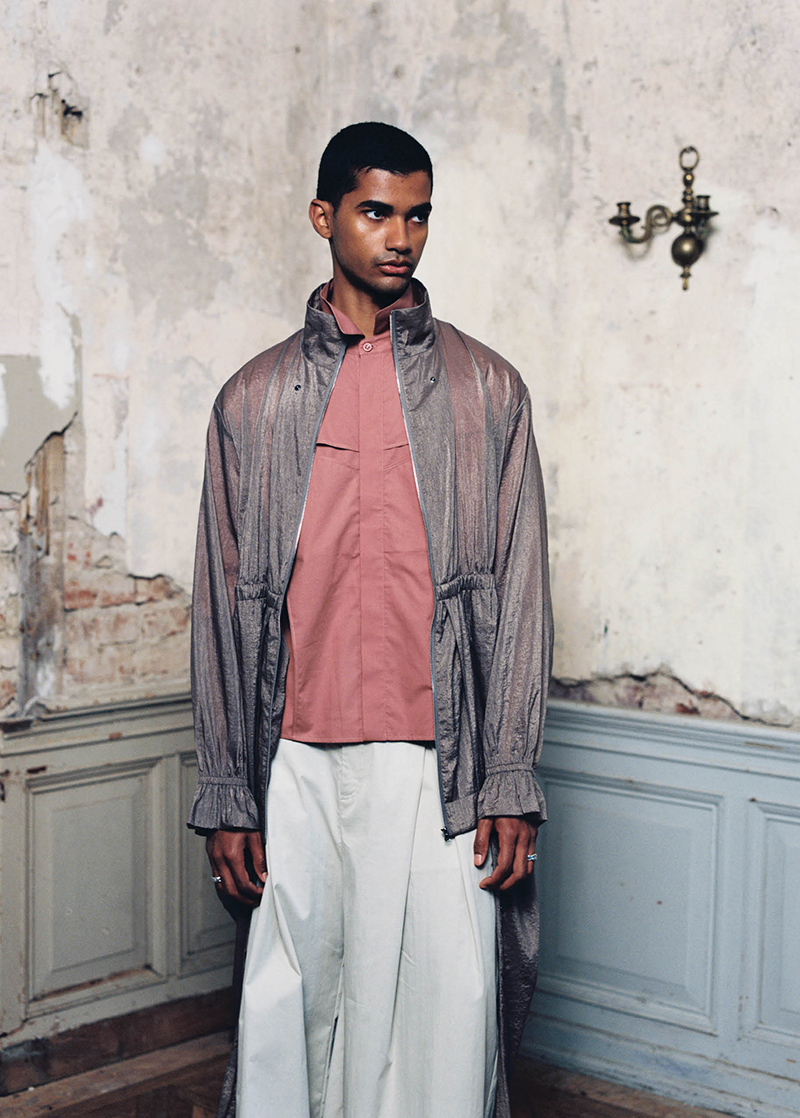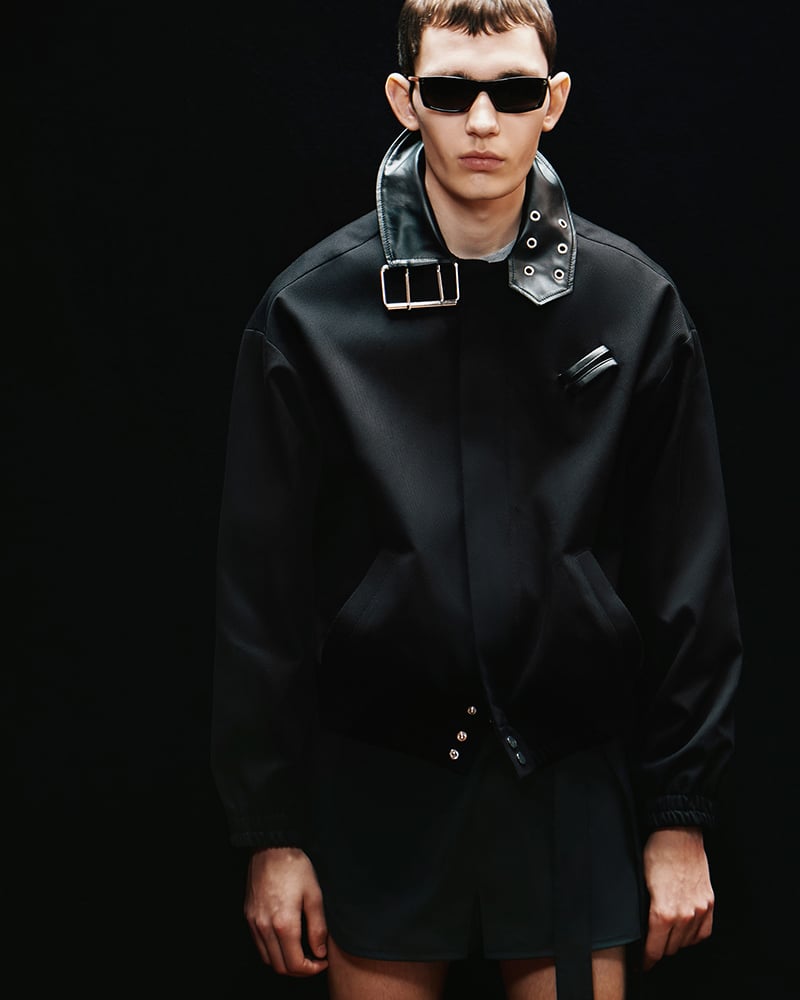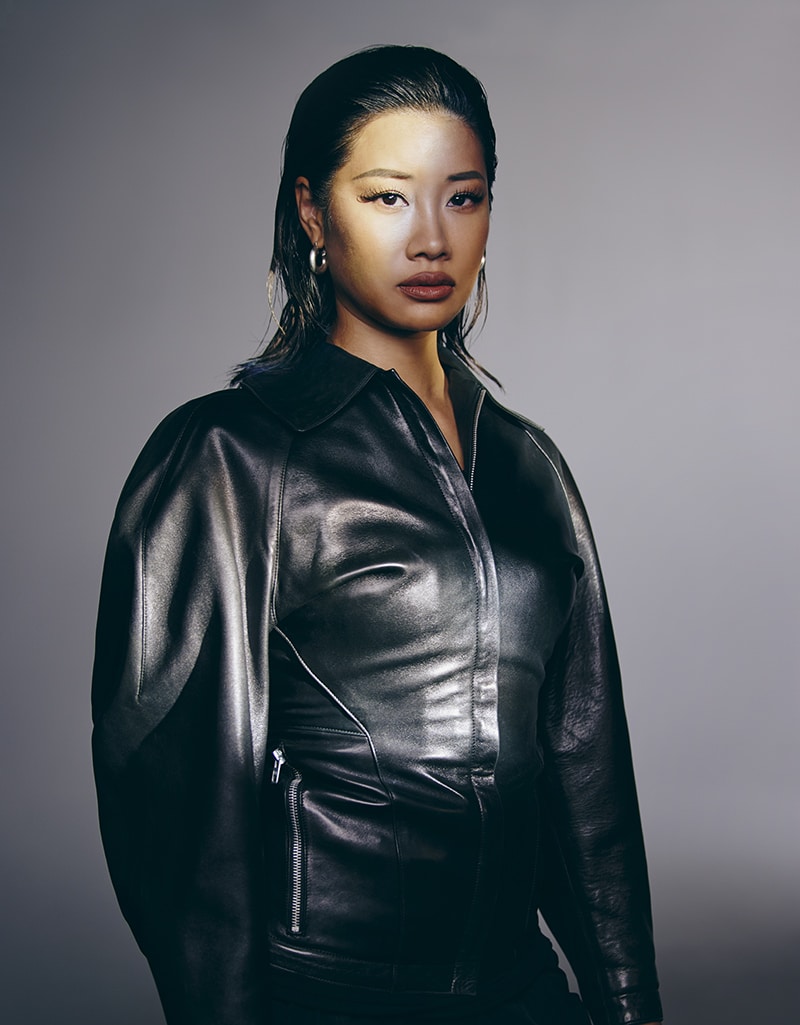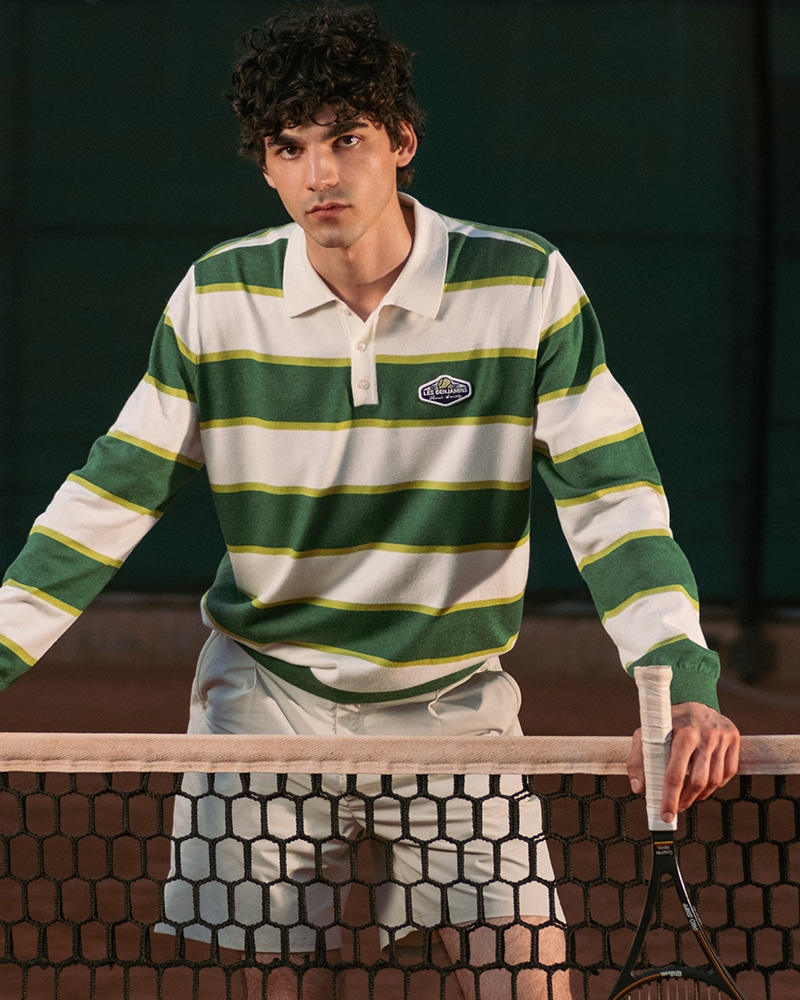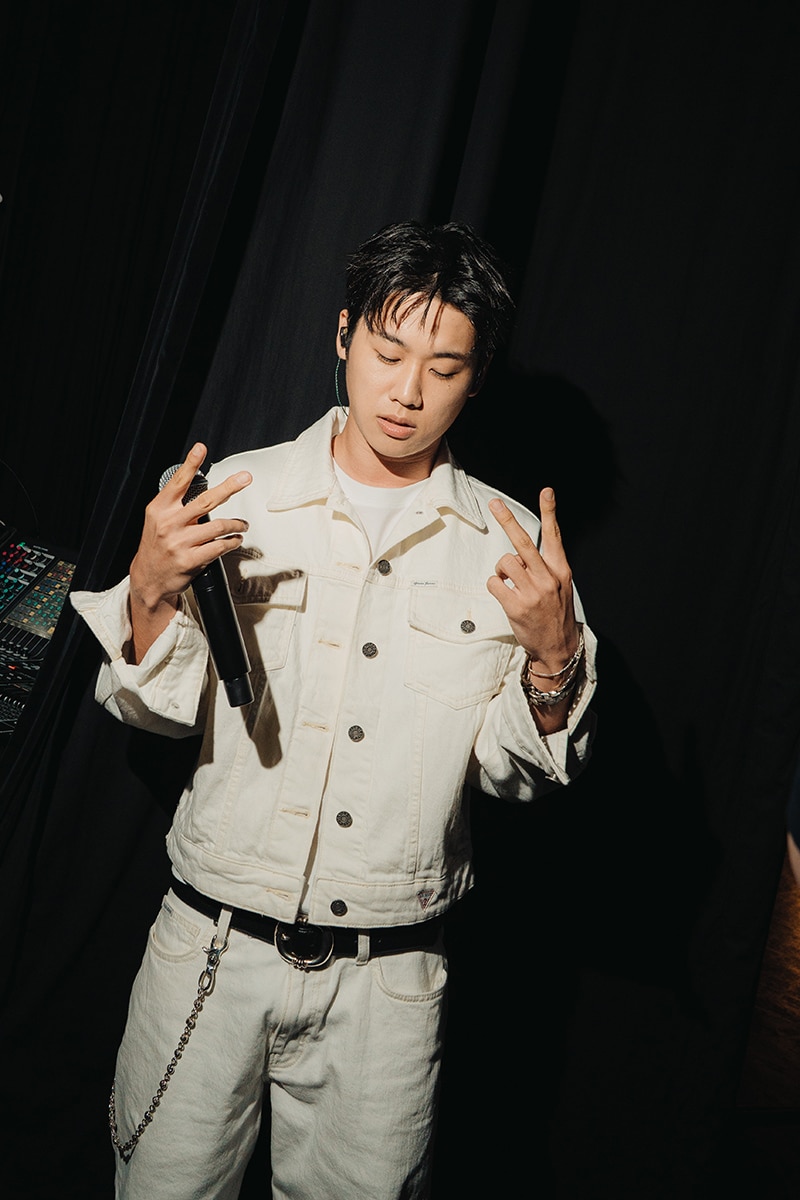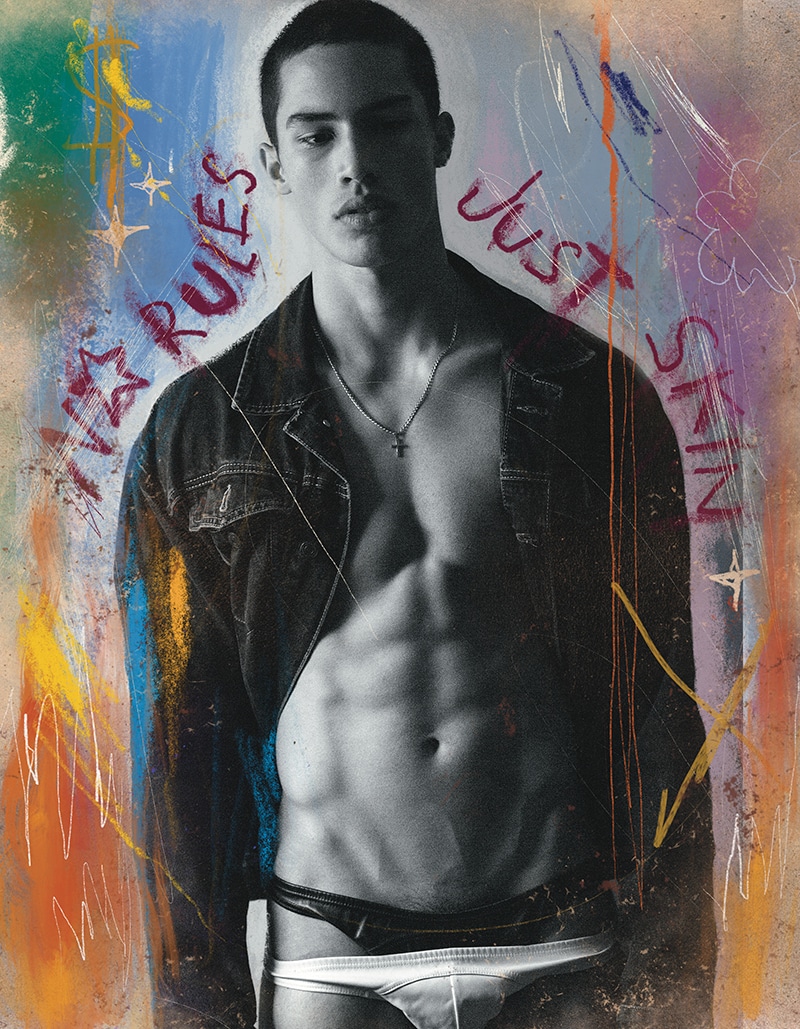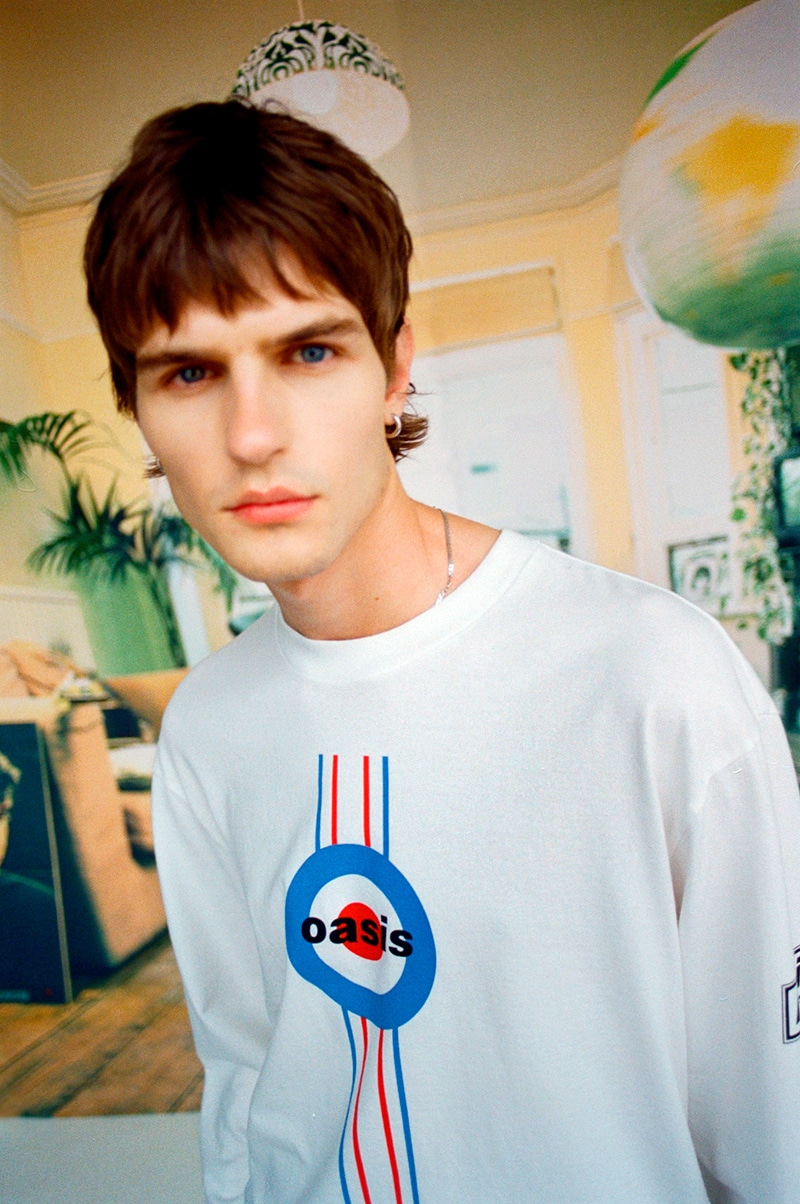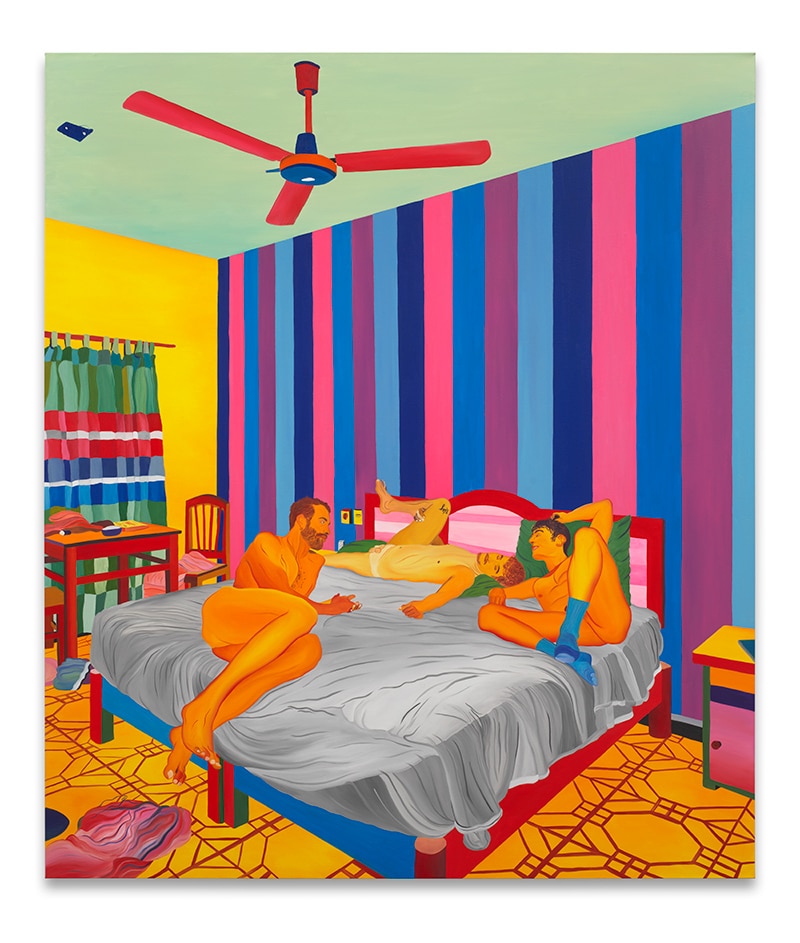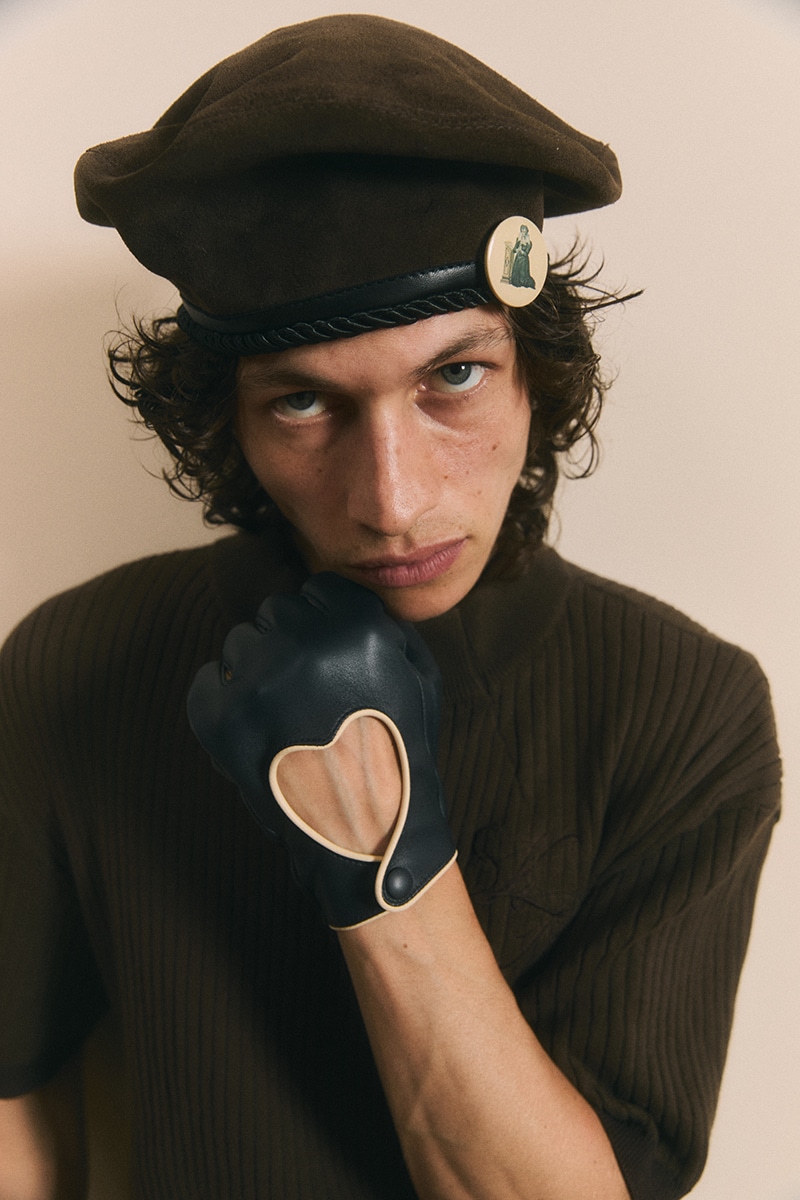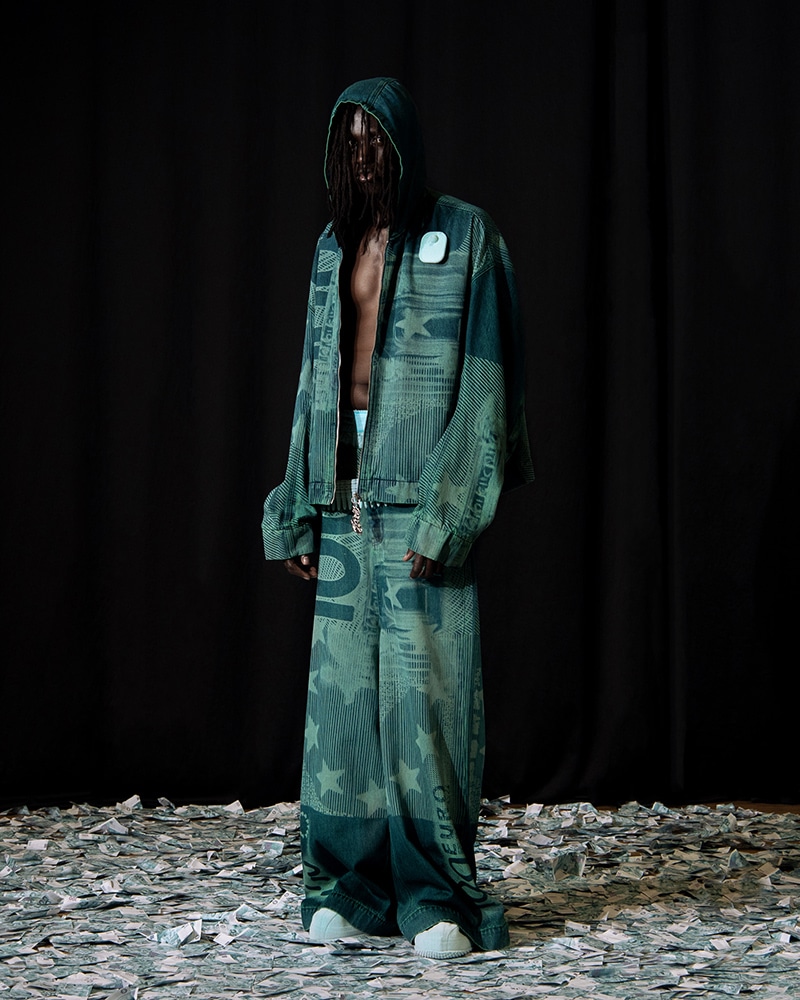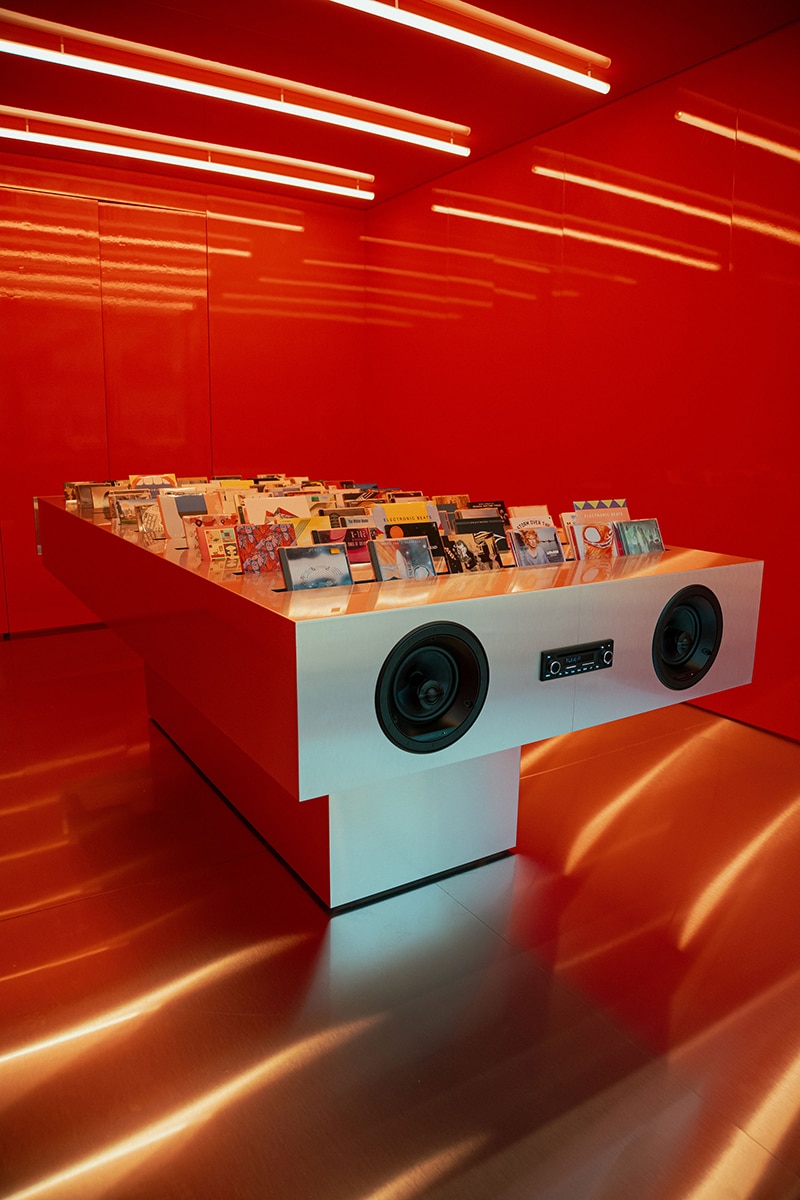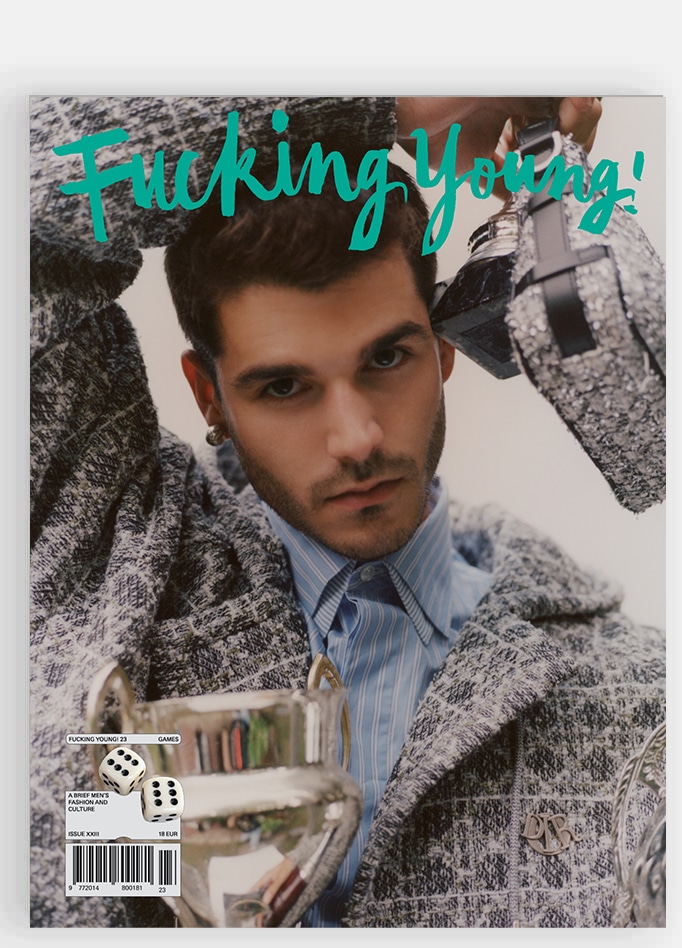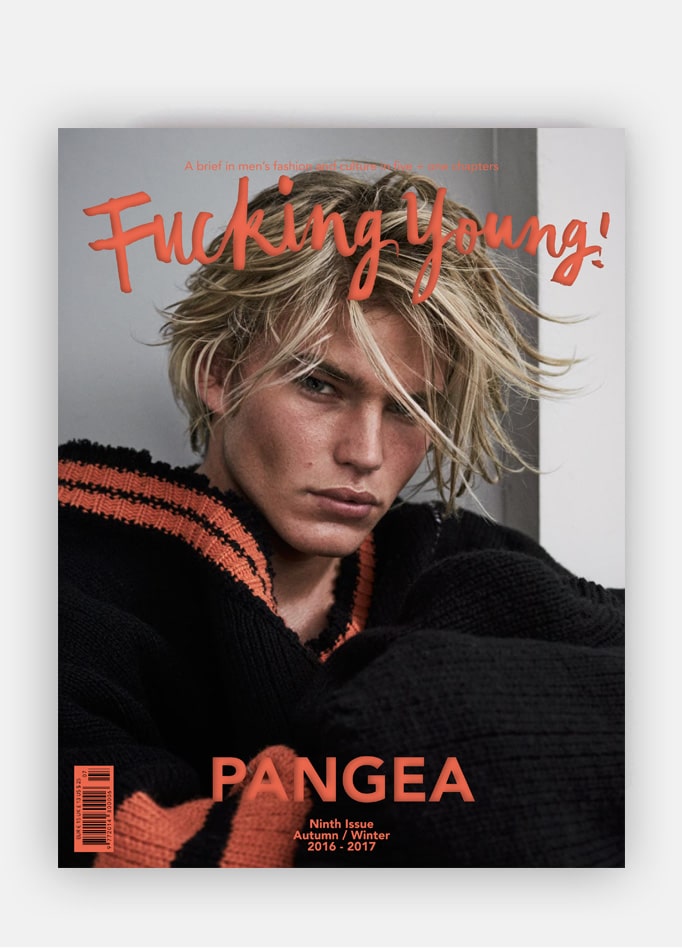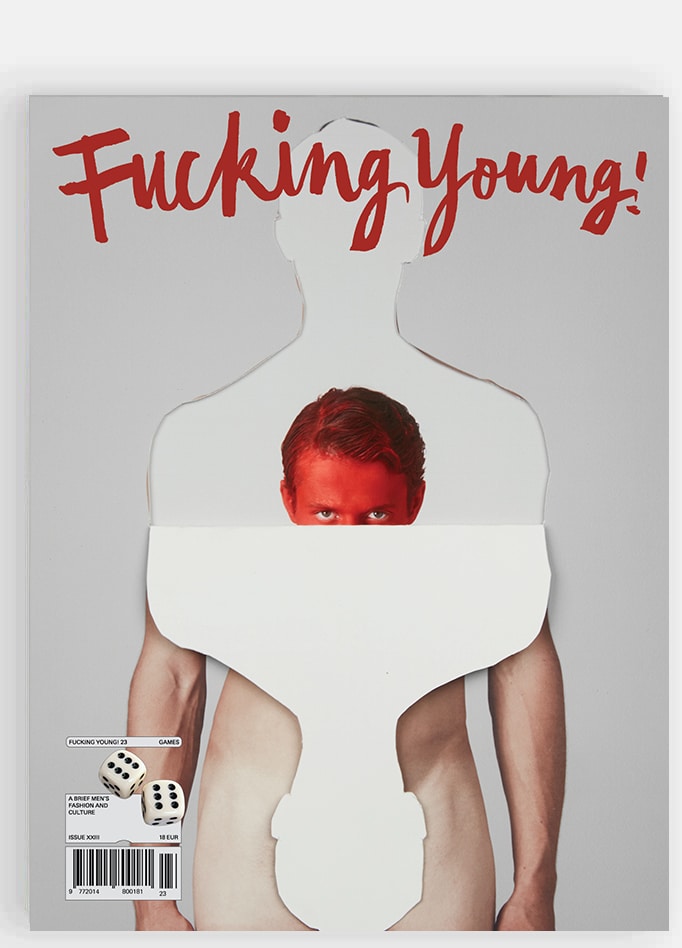Moments before the release of his debut album ACHILLES, David Lerner unveils the single Petrified – a song on the verge of new wave and art-pop that sounds like a lost gem from the 80s, grappling with the urge to escape. It was written following a complex relationship. The speaker in the song describes flight as a way of life, which leads him to avoid real attachment. The composition and the musical production respond to this with a sense of pursuit and a prominent rhythmicity, like rapid heartbeats while running. In contrast to the content of the song, the musical atmosphere is highly danceable and pushes forward – which creates a bittersweet tension that accompanies the entire song. Scorching guitars are woven into a fabric of synths from the eighties and bongos that give the song a Caribbean and infectious feel.

PETRIFIED artwork. Shot by Edo Asoulin, painted by Shay TRA Litman
In his work, David blends pop qualities with underground cultures; his songs are multi-dimensional, whimsical and fluid. His voice is thick and husky, echoing the delivery style of Morrissey, Chris Issak and Bruce Springsteen on his Nebraska album; sometimes ethereal and celestial, sometimes direct and straightforward. The 26-year-old musician and writer from Tel Aviv spent 12 years of classical training. Lerner has evolved his sound to encompass art-pop, new-wave, avant-rock, and jazz influences.
Lerner’s debut album, ACHILLES, set for release on June 27th, is the culmination of four years of dedicated work. Lerner has performed at some of the most important venues in the local scene, including Teder, Phi Garden, HaOzen and Mazkeka, and collaborated with artists from various fields (Efrat Ben Zur, Alek Lee, Autarkic, Hen Yanni, Reines Girls, Halel Givon, Dr. Ofri Cna’ani, Zoe Polanski).
The artists himself confesses that he’s “releasing the single and then the album with a sense of urgency, like a delayed birth”, given the state of the situation in Gaza, and the rest of the world. We found time to talk to him about the release of his debut album, the process and references behind it, the importance of performance within its work and all the inspiration that led the creation of this fantastic record, in which his queerness plays a key role.

BTS shot by Edo Asoulin
Hi David, how are you?
That’s a complicated question, isn’t it?
Today is a special day, as your new single, Petrified, is released. It’s also the second song we can hear from your debut album, ACHILLES. How does it feel to release it to the world?
I’m thrilled. My journey with this album goes back years, and it’s a work I’m incredibly proud of. I see it as an enfant terrible, a rebellious child that I’ve brought into the world, but deep down it has a heart of gold. However, in the face of the war, any action with personal gain feels trivial and insignificant. I’m releasing the single and then the album with a sense of urgency, like a delayed birth. The emotional biology leaves no choice. I know I’m privileged to do so.
I believe that creation is a humanistic act, one that acknowledges the goodness in people and the possibility of understanding one another, and I hold on to that.

BTS shot by Edo Asoulin
The video for Petrified is really powerful. You star in it with Alit Kreiz, and we can see both of you expressing the body language of love, but above all of, the importance of care in relationships. But the lyrics give us a sense of urgency, as if love is a struggle to face, and overcome. Can you tell us a bit about the inspiration behind the song?
The love depicted in the video is conflictual. On the one hand, it has a childlike, dreamy innocence of love between a mother and son. But its boundaries are not clear; it’s uncertain who is holding onto whom, who is caring for whom, who is responsible for whom. The feeding scene, for instance, raises questions about the motivation behind it—it’s an act that seems caring, but is it really? What happens when the object of love refuses to eat? The crawling and clinging scene of the mother figure symbolizes a love so dependent that there’s no room to breathe. Is it still love?
I believe that love must be dynamic, allowing for change, growth, movement, and freedom of action even when one party decides to act in a way that doesn’t satisfy the other. This album is full of conflictual love songs. I’m a very loving person, and as such, I’ve been burned by love in my life, and I feel this is a topic not discussed enough in songs. So, I wrote an album filled with questions about love, not necessarily surrendering to it or praising it.

Frame from Petrified video
The video explores a symbiotic relationship between a mother and child and the attempt to break free from it. You’ve also dedicated the piece to your mother, what was it like to explore such a sensitive and emotional path?
I had the privilege of working with Alit Kreiz, who managed to embody the mother figure in a way that astonished me. Sensitive issues do arise in the video, and the experience on set was intense, but also very delicate. I feel that one of my roles as an artist is to delve into the most sensitive areas within myself, identify the universal elements in them, and infuse them with insights and beauty, even in the wounds. I hope I succeeded in that, and I want to thank the director Tamir Faingold, who co-wrote the script with me, and the cinematographer Miky Wajnerman, for their sensitivity, wisdom, and clarity that helped me translate past experiences into something tangible.
And most of all, I want to thank my mother, for all the beauty and complexities in our relationship that have brought me to where I am today. I wouldn’t be here without her, for better or worse.
Caught, the first single, plays with genre. It reminds me of the video for Modjo’s Lady (François Nemeta, 2000) or the film Dreamers (Bernardo Bertolucci, 2003). Both the song and the video are almost like a performance piece. Again, there is tension and a theatrical aspect. How did the idea for both the song and the video come about?
As I mentioned, I see my role as an artist as someone who looks deeply into themselves and presents a certain kind of truth, very personal yet relatable, to help others not feel alone in their own experiences. Performance artists have always been a huge inspiration to me; I admire the totality of artists like Marina Abramović and Pina Bausch and their ability to distill very complex things into simple images that are powerfully experienced through the body. Contemporary Greek cinema, which draws a lot of inspiration from performance art, also influenced me in making the two videos.
I deeply respect the work of directors like Yorgos Lanthimos and Athina Tsangari. But it’s always important for me to stay within the realm of pop. I want to be understood, and under no circumstances do I want to appear condescending to my audience.
ACHILLES is your debut album, which will be released in two weeks. You’ve spent four years working on it, what was the process of creation and development like, how did you approach the musical and technical side?
I was very involved in the production of the album from day one. I had the privilege of working with a talented producer like Shlomi Mantsur. Beyond his terrific musical abilities, he has an extraordinary talent for understanding me and translating my ideas into something tangible. We worked together for four years, which is a long time… I’m not entirely the same person I was when we started. It took me time to reconnect with the 22-year-old I was, who has changed so much since then, to love his ideas and his charming naivety. Today, I’m prouder than ever of this work and feel that I’m learning to love all the demons from my past through it.
The album is based on the idea of “escape as a way of life, which leads the protagonist to avoid real attachment”. There seems to be, in most of the songs, a contrast between the rhythm and melodies and the lyrics. What are the experiences that helped you create this album, and how did you approach them to make the songs on the album?
I grew up in a complicated household, filled with love alongside secrets, madness, and lies. I’m of Turkish descent, and let’s just say that sometimes I find myself watching ridiculously melodramatic Turkish soap operas and deeply relating to them. I’ve been in relationships with both men and women where I felt like I was repeating old patterns from home, of dangerous and unstable love. It took me years of self-care, therapy and reading psychoanalysis texts to reach a place where I can say I’m ready for healthy love, and creating art was an integral part of that process.
I see this album as a monument to many extreme and traumatic experiences from my past, but it also holds hope for healing and a great love that covers everything. I can’t wait to release it to the world.

ACHILLES artwork. Shot by Edo Asoulin, painted by Shay TRA Litman
Mourning Vine is awesome. One of the standout tracks on the project, where lyrics about self-love and love for others are mixed with exceptional instrumentation. You can even hear a fantastic saxophone. How did you put all the pieces together for this song?
Mourning Vine is one of the pure love songs on the album, which is actually a breakup song. I sing in it: “What can we be without ourselves? / A love / To redefine / What has been left / A mourning vine,” as a kind of love that enveloped my ex-partner and me during times when we didn’t really know who we were, but we knew we loved each other. The love gave us meaning, and when it died it almost felt as we died too. In the production, I was influenced by free jazz just as much as by the soundtracks of those Turkish soap operas. You could say this song brought me back home, to my Middle Eastern roots, but it is sung from the perspective of someone whose musical world is different.
Get Along is a song that has the power to serenade. Although the lyrics are a bit dark in the sense of uncovering someone’s mask, it has a similar feel to a classic John Gant song. What is the story of Eliza and this tale?
I’m flattered by the comparison to John Grant, who is a big influence. Eliza, in a way, is a portrayal of my feminine side. After years of repression in my closeted days, she stepped out – alongside and within masculinity. However, this song is sung from the perspective of a guy in the closet, who trades his emotions to gain closeness to others. But this closeness is unattainable as long as you’re isolated within your own world. In the end, Eliza steps out into the world – “Now you’re on their side,” I sing there – but I also wanted to dwell on the tragic element of this exit, on the loss of the previous self-image one experiences when leaving the closet. There’s something sad about reinventing yourself, as wonderful and liberating as it is.

BTS shot by Edo Asoulin
“My body’s changing all the time, and I can comprehend the time of my body” is one of the most interesting queer statements we find throughout the songs (My body). Was it important for you to capture queer experiences and reflections through your music?
Certainly. I identify as queer, and there’s nothing in my life that I experience, whether I want it or not, outside of this life experience. I’m fascinated by the ability of people – queer or not – to stretch the boundaries of their own bodies, to understand its implications and how they want to carry it. Many queer people have a moment in their lives where they reclaim ownership of their bodies; I wanted to capture something from that moment.
Were there any songs on the album that were more difficult to create or finalise?
Of course! Every song demanded tweaking and interpretation. Mourning Vine didn’t feel complete until the claps joined in, My Body went through countless transformations. But there were also easier songs, like Caught and Get Along, that we knew very quickly what they needed and how we wanted them to sound, and we finished them within a few days, like magic.
BTS shot by Edo Asoulin
You are 12 years classically trained and you also write poetry. I wonder how these two aspects of your artistic experience influenced others, such as this album.
Classical music and poetry are very dear to me, but I feel like both of these fields tend to entrench themselves in the ivory tower. The sensory and intuitive experience of contemporary music allows me to synthesize influences from these fields into something that, in my opinion, manages to get into the listener’s heart more quickly, whether they can identify those qualities or not, and I’m okay with that. I prefer that each listener experiences the piece in his/her own way and takes from it what they need.
The Spark, the closing track ACHILLES, is a cover of the Sharon Roter song, written by Berry Sakharof. What can you tell us about the origins of this song and why it was important for you to end the album with it?
The Spark is one of my favorite songs ever, a local underground classic, sung in Hebrew from a woman’s perspective. It speaks about surrender within love: “For with you I walk / Don’t know where.” The return to my mother tongue, Hebrew, along with singing in from the female perspective, felt like an ideal closure to an album that deals with different forms of love. I wanted a grand finale, where I connect to a feminine stance heard in a male voice, while returning home to the mother tongue (and there’s a reason why it’s called mother tongue and not father tongue). It’s a queer ending to the album that moves between more or less challenging positions and experiences of love, because I believe in androgynous love, containing both the masculine and the feminine within us. Or as the song goes: “Only love can”.

BTS shot by Edo Asoulin
Through the media, we often read news about Tel Aviv being a pro-gay culture; it is one of the major cities in the world where gay pride is a massive event. But we have also seen how this is not so much the case for people who don’t belong to the LGBTQI+ G. How do you see the current queer scene in the city and how included do you think other identities feel? I know it’s a difficult question, but queerness has a lot to do with liberation. Given the current situation in Palestine, what do you think about what is happening?
Tel Aviv is indeed a very accepting and open city for LGBTQ+ individuals, but like many other capital cities, it is much more open, liberal, and left-leaning than the rest of the country. Many LGBTQ+ individuals, Jews and Palestinians alike, come here and live their lives peacefully. Yet, despite the pride parades and the flourishing queer culture, Israel, which presents us LGBTQ+ folks as a PR showcase to the world, refuses to grant us basic rights, like the right to marry here. This discrimination is sharpened in light of the ongoing war. As a human being, as a queer person, I cannot remain silent in the face of the destruction and devastation our government is carrying out in Gaza and the ongoing occupation, which is unjustified. I lost friends on 7/10, my friends lost soulmates, and yet my heart aches every day for the loss on both sides of the imaginary border imposed on us. I acknowledge that the pain on the Palestinian side is beyond description, and the destruction in Gaza is catastrophic and must stop immediately. However, holding innocent captives in Gaza is a tragedy, and I call for their immediate release. My friends and I protest about this every week.
However, the incitement happening worldwide against us Israelis, as if we all support this regime, is unacceptable to me. There are many regime opponents here who are involved in a crucial struggle, and anyone who wishes well for the people of this land should support it. Ultimately, change will only start from within. Anyone who desires good must support, not blindly, the liberal, positive, and humane forces living here, on both the Israeli and Palestinian sides.
Understanding will begin from here; peace will start from here. There’s no other way, and hate is definitely not the right path for this justified struggle.

David Lerner performance shot by Yahav Trudler
Finally, any wishes for the future?
All I hope for right now is peace. Here in our region and everywhere else in the world. Well, there you have it, I ended up like a beauty queen. I said I wanted to be pop, right? 🙂
David, all the best with ACHILLES, we hope it brings you lots of fun and good times.
Follow him: @david___lerner
Interview by Antonio Rodriguez @awerpower
Credits
Created by David Lerner & Tamir Faingold
Directed & Edited by Tamir Faingold
DOP: Miki Wajnerman • Script: Tamir Faingold & David Lerner
Starring Alit Kreiz & David Lerner
Styling: Shy Michael
Art Direction: Gili Segal
MU: Yael Landau
Graphic Design: Alma Klemes
Color: Tamir Faingold • BTS: Edo Asoulin
The song was produced by Shlomi Mantsur and recorded at Kitcha Studios
Special thanks to Tamara Sonnenfeld, Dana Peker, Shlomo Sonnenfeld, Halel Givon, Tamar Perry, Guy Sade, Lanuel Tiran-Tishby, Hila Gluskinos, Roy Lerner, Avi Tuchman, Galia Yaron, Alma Karvat Shemesh, Rakefet Levy
Dedicated to mom

